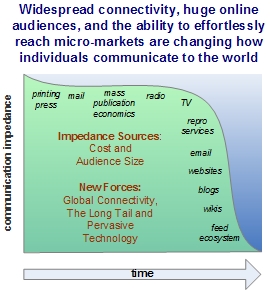Mitch is 90% right about change

As I read Mitch Ratcliffe's recent rant on change, I really felt myself agreeing with him wholeheartedly, until I got about halfway through. More on that in a moment. I do speak with people all the time who feel that all the current talk about the latest new age trends on the Internet, whether it's the Wisdom of Crowds, Web 2.0, or social computing, is just cut loose from reality. Too often, they feel it's content-free marketing or other vague thinking that doesn't have relevant bearing on actual changes in our industry and society.
This means how things change is itself changing, in that the economic barrier to influence, interact, and communicate with people anywhere now essentially no longer exists. In my mind, part of the problem that Mitch is trying to explain is that technical folks in particular seem to come in two groups; those who are high-level system thinkers and those who areobsessively focused on the details, though certainly many of us are both. And technology is now so suffused into our lives that it's affecting virtually everything we do but especially how we interact with each other. It's not called the Web for nothing, folks. And so there does seem to be a big push to figure all this out and be able to explain how technology is shaping our lives today and just as importantly, where it's going.
Personally, I'm fascinated by the current major intersections of technology, institutions, and society. We can all see the changes all around us. Heck, my current phone has me permalogged into IM, is connected to all my e-mail accounts, lets me surf, blog, photoblog, videoblog, and much more from anywhere I happen to be standing. I find myself so much more in touch with friends, family, and colleagues. And this is just the tip of the iceberg in terms of what's happening.
I do think that idea that folks like Ray Kurzweil with his singularity notion are espousing is something most people are not ready to absorb yet. However, others like Tim O'Reilly with Web 2.0 and Live Lab's Gary Flake and his Internet Singularity are capturing important trends that are much closer to what's really happening today, right now. In the end, we do love to put concepts in a box and feel like we fully understand them.
But getting back to what Mitch was compaining about and that, if I read him right, he's saying that there's nothing new here folks: Innovation has always come from the edge, social systems have always been the driving force of change, and shifts like this are nothing new and are in fact needed for progress. This is something that Thomas Khun, author of the seminal The Structure of Scientific Revolutions, would wholeheartedly agree with.
But Khun was another big thinker that attempted to boil things down so they could be hacked in the very way that seems to bother Mitch. And this is where I differ with Mitch. While there has been up to now a general pattern in change and perhaps too many folks like Khun have made a living out of trying to describe them, there is a game changer in the works. Namely that technology is relentlessly moving control and power to the edge of our social systems and to everyone who wants it, not just a few people.
Mitch however argues that the power was always there and disruptive ideas and technologies can come from anywhere, but are more likely to come from outside the walled gardens where folks have built institutions to lock in the status quo. The fallacy in his argument is that it could come from anywhere.
Before now, the barriers to new and disruptive ideas and technologies have always been quite high. You had to be very lucky, very resourceful, or had access to real wealth in order to overcome the natural barriers in place. Influential and respected people like media baron Ruport Murdoch seem to fully realize this as he witnesses the seeming fundamental reordering of media with things like widespread blogging, peer production news, and with things like YouTube, Skype, and a horde of others fundamentally democratizing communications and media. So as I stated above, this means that the means by which things change is itself changing, in that the ability to influence, interact, and communicate with people anywhere is now essentially free of cost.

The upshot is that the existing high barrier, high cost, high scarcity communication channels are essentially gone. This does seem to turn things on its head and it'll be extremely interesting to see how industries, society, and commerce will be remade by this. Now, don't get me wrong, Mitch is right on that economic drivers aren't changing and that people aren't changing, quite the contrary, but the elimination of communication impedance does mean that these forces will be completely refunneled through these new channels and the aftereffects will be very interesting to watch.
Is change the only real constant worth worrying about or is it worth focusing on the unique aspects of change today?